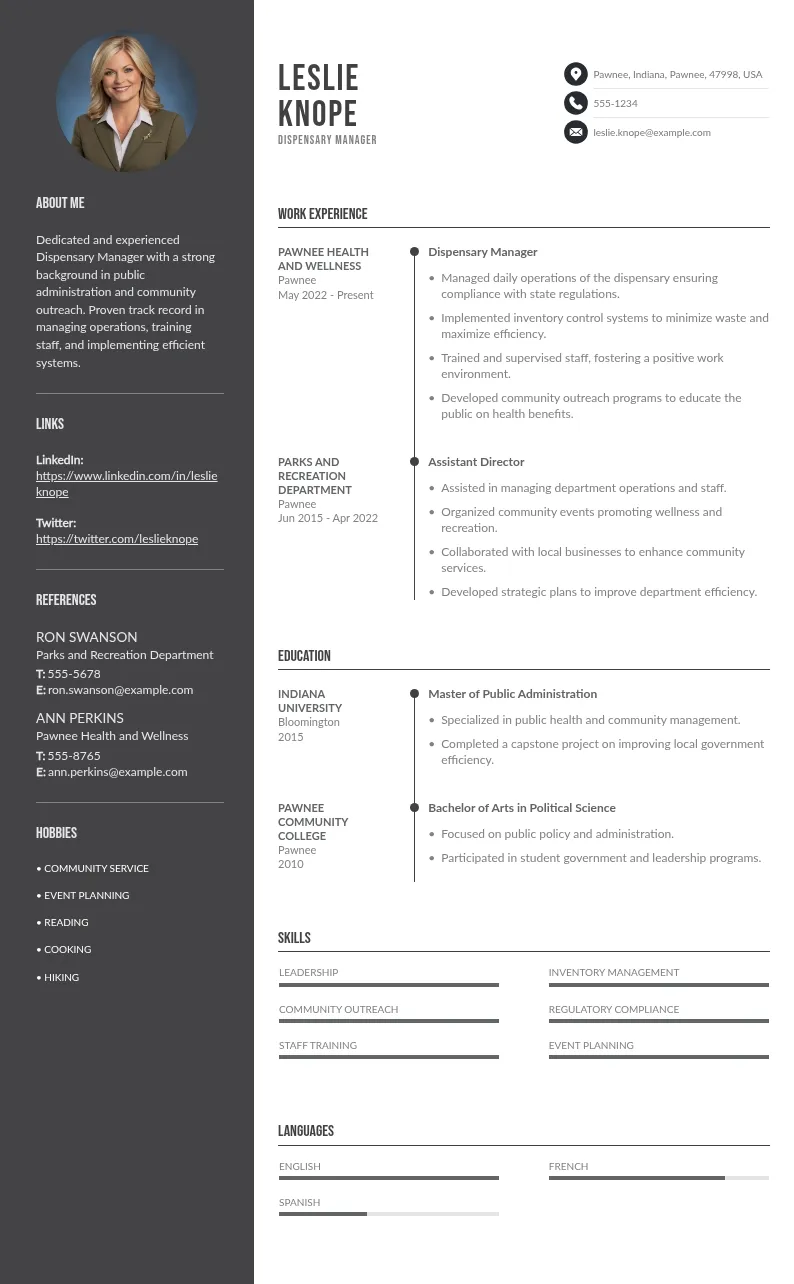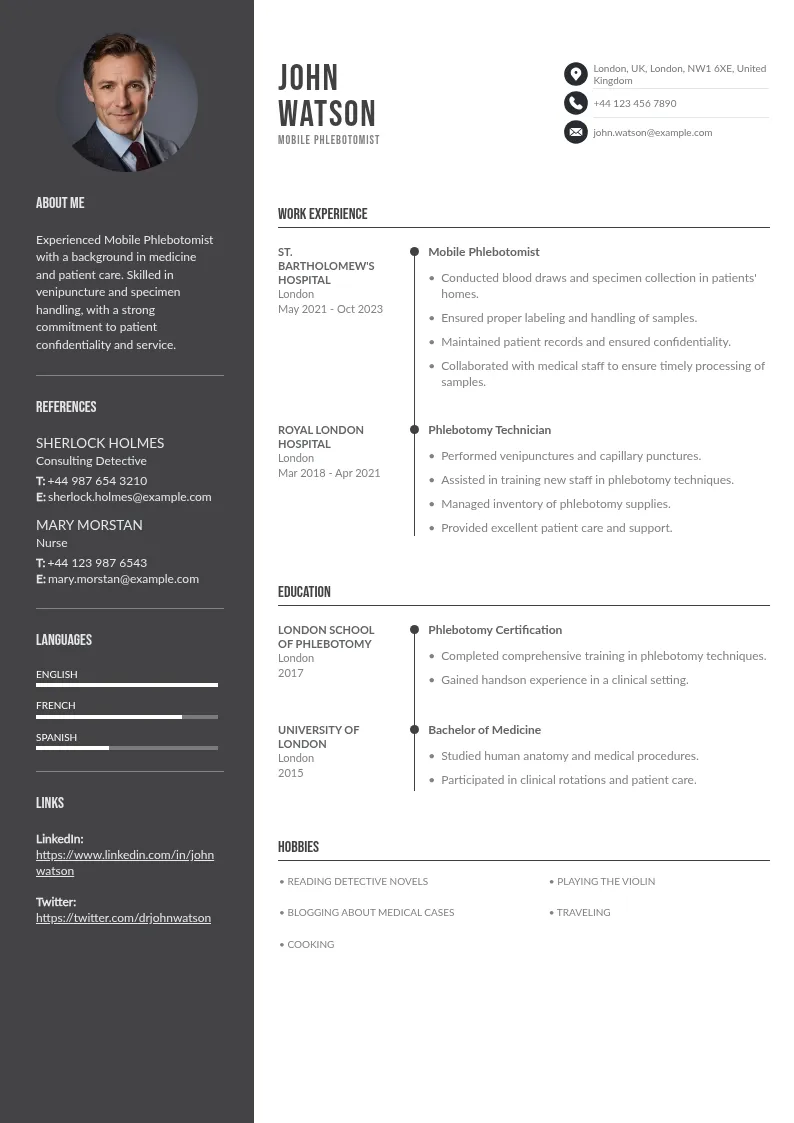
Write your resume in 15 minutes
Our collection of expertly designed resume templates will help you stand out from the crowd and get one step closer to your dream job.


In this guide, we’ll go over the top 10 skills every PR specialist needs to stand out. From storytelling to crisis management, these are the must-haves for a strong career in public relations.
10 Top Skills for Public Relations Specialists
Any PR specialist must know how to effectively craft messages, build relationships, and handle tough situations. But what separates the best from the rest? Here are the 10 skills every PR professional should master:
1. Strong Writing Skills
PR is built on words. Press releases, social media posts, speeches, emails; every message matters. A strong PR specialist knows how to write clearly and persuasively.
Good writing involves making sure people understand the message quickly. Short, direct sentences work best. Whether it’s a press release or a tweet, the goal is the same: effectively communicate the right message in the simplest way possible.

If writing isn’t your strong suit, practice every day. Read good PR content, study different writing styles, and learn how to get straight to the point.
2. Media Relations & Networking
Building strong relationships with journalists, bloggers, and influencers is a big part of PR. If you can’t get the media to care about your story, your message won’t go far.
Good media relations start with trust. Reporters don’t want endless sales pitches. They want real stories that matter to their audience. A PR specialist needs to know how to pitch the right story at the right time.
3. Storytelling
Facts alone don’t inspire people. Stories do. Public relations specialists who know how to tell a good story make a bigger impact.
A great PR story has three things: a clear message, an emotional hook, and a reason for people to care. It’s not just about promoting a brand; it’s about showing why it matters.
Think about the brands people love. They don’t just sell products; they tell stories that connect with their audience. PR professionals should do the same, turning company news into stories that spark interest and engagement.
4. Crisis Management
Bad news spreads fast. A single mistake, misunderstanding, or negative review can damage a reputation overnight. Public relations specialists need to know how to respond fast and stay calm under pressure.
The key to crisis management is preparation. Every brand should have a crisis plan in place. Who speaks for the company? What’s the response strategy? How do you control the message?
When a crisis hits, honesty and transparency matter. Trying to cover up a mistake usually makes things worse. A good PR professional finds the right words to fix the situation while keeping public trust intact.
5. Strong Digital Communication Skills
Social media platforms, blogs, emails; most public relations today happens online. A PR specialist needs to understand digital platforms and how to use them effectively with the right digital skills.
Every platform has its own style. A formal press release won’t work on Twitter. A quick, casual post won’t work for a corporate blog. Public relations professionals must know how to adjust their messaging based on where they’re communicating.
They also need to know how to handle online reputation. A single negative comment can go viral. A good PR professional monitors brand mentions, responds quickly, and manages public perception before things escalate.
6. Strategic Thinking & Planning

Great PR involves shaping public perception over time. This requires strategy. A well-planned campaign and communication strategies grab attention and deliver the right message to the right audience at the right time.
Every PR campaign should have a clear goal. Are you building brand awareness? Fixing a reputation issue? Launching a product? Without a plan, public relations efforts can feel scattered and ineffective. A strong strategy includes defining key messages, identifying target audiences, and choosing the best communication channels.
Good PR specialists look at the big picture. They plan campaigns that align with company goals, track progress, and adjust PR strategies based on results. They also anticipate challenges, prepare backup plans, and stay flexible to make sure campaigns stay effective in a fast-changing world.
7. Public Speaking & Presentation Skills
PR specialists often represent a company in public. Whether it’s for a media interview, a speech, or a client meeting, strong speaking skills matter.
Public speaking isn’t about being perfect. It involves confidence, clarity, and connection. A good speaker makes complex ideas simple and keeps their audience engaged.
If public speaking feels intimidating, practice helps. Join speaking groups, take media training, or rehearse in front of a camera. The more comfortable you get, the more effective you’ll be.
8. Adaptability
PR moves fast. One day you’re working on a campaign, the next you’re handling a crisis. Trends change, algorithms shift, and new social media platforms emerge all the time. What worked last year might not work today.
A good PR professional stays flexible. They learn new skills, adjust PR strategies when needed, and stay ahead of industry changes. Being adaptable also means knowing when to pivot; if a campaign isn’t working, it's better to tweak the approach than waste time on something ineffective.
The best way to stay adaptable? Keep learning. Follow industry news, experiment with new tools, and stay open to change. Attend webinars, take online courses, and study how top brands handle shifts in public perception.
9. Emotional Intelligence
PR is all about people; understanding them, connecting with them, and managing their perceptions. That takes emotional intelligence.
Emotional intelligence means knowing how to read the room. It involves empathy, listening skills, and responding in a way that makes people feel heard.
In PR, this is especially important during tough conversations. Whether handling a media crisis, negotiating with a client, or managing a team, the ability to stay calm and communicate with empathy makes all the difference.
10. Reporting Results
PR must make a big impact. Companies want to see results. That’s why public relations specialists need to track and measure their work. Clear data helps prove the value of PR efforts and guides future PR strategies.
Good reporting answers key questions:
- Did the campaign reach the right audience?
- How much media coverage was earned?
- Did brand perception improve?
- How did engagement levels change across platforms?
- What was the return on investment?
Ways to Level Up Your Public Relations Skills

Improving your PR skills is all about staying current and practicing regularly. PR is constantly evolving, so there’s always room to grow. Here are some practical ways to take your skills to the next level:
1. Keep Writing
Writing is the backbone of PR. The more you write and publish, the better you’ll get. Start by creating your own press releases, social media posts, or even blog articles. Focus on being clear, concise, and persuasive. Try different writing styles to see what works best in different situations.
2. Take Online Courses
There are plenty of online courses available that can help you sharpen specific PR skills. From writing and media relations to crisis management and digital PR, these courses can give you deeper knowledge and new techniques to add to your PR resume. Make learning a regular habit.
3. Stay Updated on Industry Trends
PR changes fast, and staying ahead of the curve is key. Follow PR blogs, subscribe to industry newsletters, and join professional groups. This will help you spot new trends early, giving you an edge in your work.
4. Build Your Network
Building strong relationships with journalists, influencers, and industry peers is an ongoing effort. Attend industry events, engage on social media, and stay in touch with your contacts. A solid network will make it easier to get your stories out and find new opportunities.
5. Get Feedback and Learn from Others
Don’t be afraid to ask for feedback from colleagues, clients, or mentors. They can help you spot areas for improvement. Also, look at how successful PR specialists approach their work to produce a positive public image. Learn from their strategies and apply them to your own.
6. Practice Public Speaking
Public speaking can be intimidating, but it’s a valuable skill on a resume for PR specialists. Practice speaking in front of a mirror, with friends, or by recording yourself. The more you practice, the more confident you’ll feel in interviews, meetings, and presentations.
Improving your PR skills takes time, but it’s well worth the effort. Stay curious, keep practicing, and never stop learning.

Final Thoughts
Public relations is fast-paced, unpredictable, and always evolving. To stand out, you need strong communication skills, strategic thinking, and the ability to adapt. Writing, media relations, and storytelling help you share the right message. Crisis management and emotional intelligence help you handle tough situations. Digital communication and reporting keep you ahead in a changing world.
The best PR specialists never stop learning. They follow industry trends, improve their skills, and stay flexible. A good reputation takes time to build, but the right skills make it easier to manage and protect.
If you focus on these 10 skills, you’ll be more confident, more effective, and more valuable in any PR role.

















